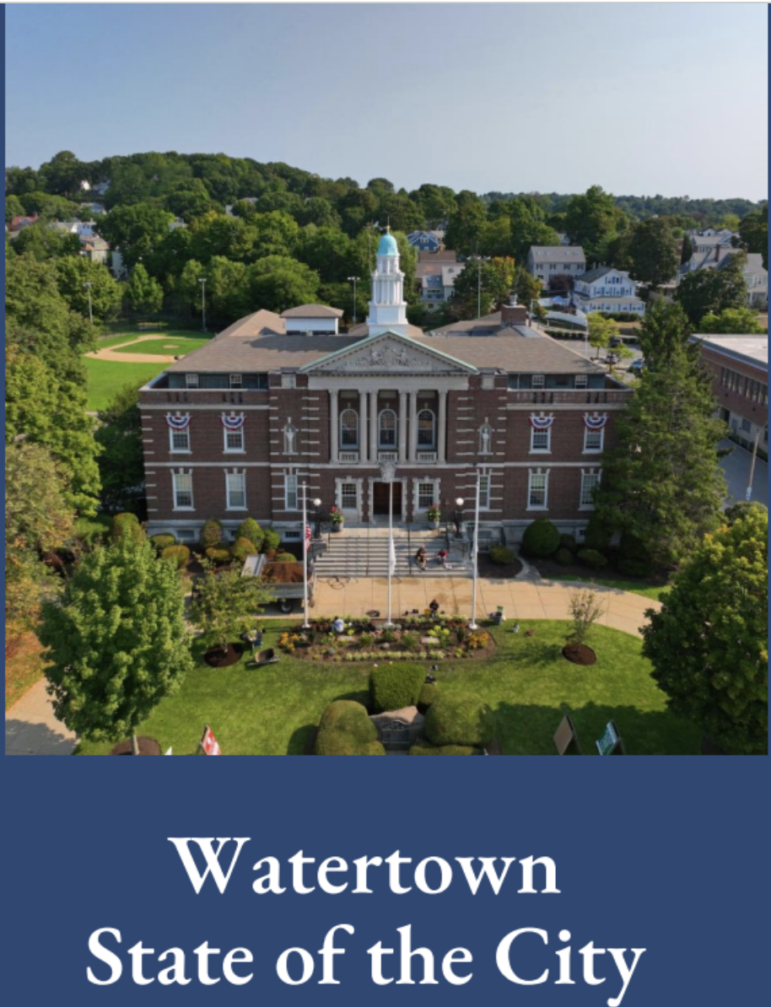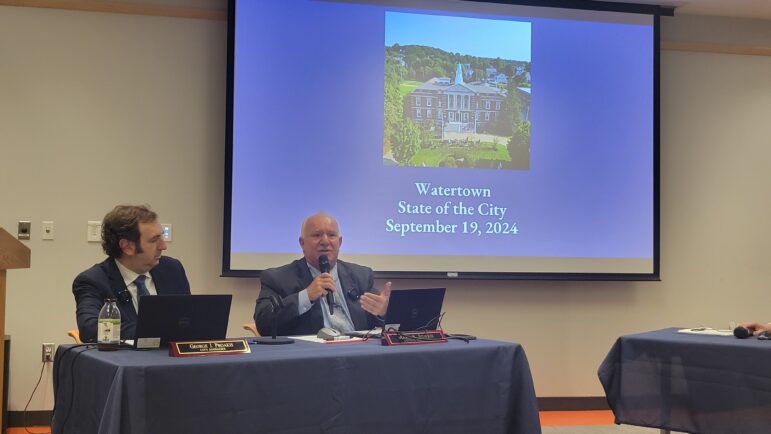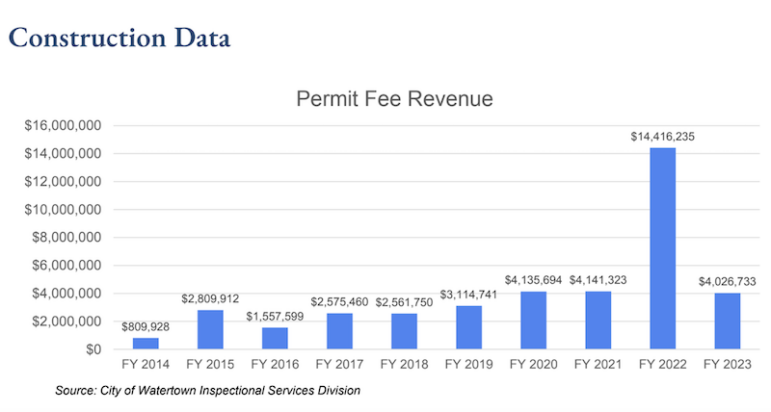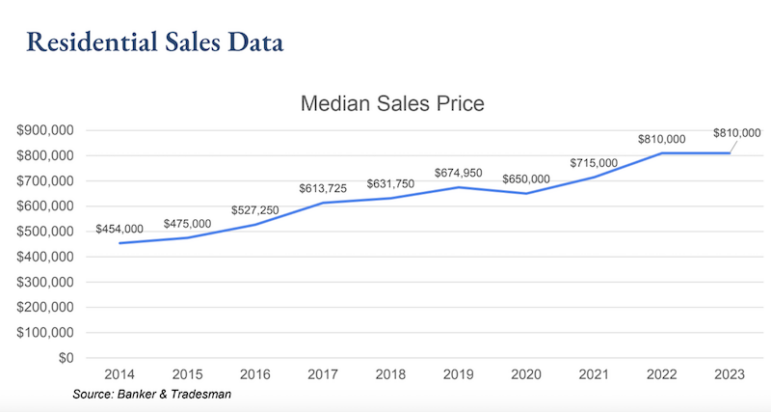
The State of the City is “healthy and strong,” City Manager George Proakis stated Thursday evening. Watertown sits in a good position financially, Proakis said, the Council has done a good job improving and replacing facilities and parks, the City has been able to fill long-time openings, and there are some major efforts in the works, such as the new high school, the human services study, and Watertown Square.
Proakis and City Council President Mark Sideris gave the second annual State of the City address on Thursday evening at the Watertown Library. The State of the City is a requirement added in the recent City Charter changes.
While the City’s financial situation looks good, Proakis said there is still much work to be done.
“There are challenges ahead and major investments needed, and we cannot lose sight of our focus on continuous improvement in City services, nor our commitment to fiscal responsibilities, but we’re fortunate to be building on a successful past and to have an incredible team of elected officials, employees and volunteers dedicated to the success of this great city,” Proakis said.”So, I’m confident the state of the City is quite good and that our best years are ahead of us.”

Sideris said the challenge will be continuing to make improvements in the City while the economic outlook remains uncertain in terms of new developments being built or not, which creates more tax revenue.
“I will say that I agree with George’s State of the City, stating that we’re healthy and strong, but we do have a significant amount of work that we continue to need to do, in particular, working with the manager, the City Council and the manager, because we’re looking at that new growth isn’t there and why,” Sideris said. “So, now we have to find a way how we’re going to navigate the next few years without that significant new growth, and that’s going to be a key: for all of us working together.”
Economy
The City’s economy has returned to a good place after dipping during the COVID-19 shutdown. New construction boomed in 2022, and has remained steady in other years. The City took in $14 million in construction permit fees in 2022 at the height of the life science lab boom, while in 2021 and 2023 the fees accounted for about $4 million each year. The number of people employed in Watertown, about 23,000, has returned to the pre-Pandemic level, and the unemployment rate is 2.3 percent. The only lower rate was in 2.0 percent in 2019.
Sideris said he has seen some signs that the life science sector is heating up again, though not to the levels of the early 2020s.
“The Alexandria people have sold properties for half, including in Newton, of what they paid for them and focused here on Watertown,” Sideris said. “I meet with some of these developers on occasion to discuss what they see coming up. And Alexandra is very bullish on Watertown.”

Sideris added that the recently constructed life science building on the Southside of Watertown, at 66 Galen Street, has a tenant signed up, and the owners of some of the lab buildings in East Watertown expect life science companies to lease space in their buildings.
“They still have people inquiring. The spaces might that they’re looking for might not be as big as they would anticipate, but there are still people coming back, looking for space,” Sideris said. “One of the theories about labs, from what I understand, is labs want to be where other labs are,” Sideris said. “The future looks pretty good in that and I don’t think we’re going to build any new buildings right now, but the buildings that are there are going to get filled in a reasonable amount of time.”
Proakis said he is cautiously optimistic about future projects coming to Watertown, but he will not include the new tax dollars created by new growth in Watertown before the projects become a reality.
“There are, I believe, 11 lab buildings permitted and not under construction in Watertown right now,” he said. “We are building our financial revenue projections based upon the idea that none of them start construction in the next three years. If one of them does, then we would put it into our new growth profile and say, okay, you know, someone’s pulling a building permit.”

While life science has been the predominant industry coming into town, the City has also tried to attract other sectors to come to town, such as climate tech. Proakis said he sees the redevelopment project at 10-30 Manley Way (the former trampoline park) as a building better suited for climate tech than life science labs.
The City has been able to take advantage of the growth of commercial properties by taking pressure off residential taxpayers. Watertown got an extra boost last year when the State Legislature Home Rule petition that allowed the City to collect 50 percent of the property taxes from commercial, industrial and personal properties.
“The result of that was a lot of people’s other tax bills went down this past year on their residential tax bill,” Proakis said. “We’re going to be back on the trajectory of those slow increases again, because that was a one time shift down to readjust.”
Watertown taxpayers have not been asked for an override, unlike many other communities in Massachusetts. In the last year, 63 Proposition 2-1/2 overrides have been proposed and 125 debt exclusions have been proposed around the state. Proakis said many have not been successful. Sideris noted that many of the overrides were just for the regular operating budgets, and when they do not pass that means programs and jobs were cut. Watertown has had one Prop. 2-1/2 debt exclusion in 1995.
Housing costs, however, have become a concern for Watertown and the whole region.
“Watertown has gone in the last decade from (a median home price of) $454,000 to $810,000. It’s a lot of money for a family starting out, looking at an opportunity to be in work here, and that’s one of the reasons why housing has become such a substantial conversation here,” Proakis said. “Like I’ve said in the past, housing is our greatest regional economic development challenge, continuing that job growth and that business growth in the greater Boston area.”

More details about the budget will be presented at the Preliminary Budget Overview which Proakis is scheduled to present at the Oct. 22 City Council meeting.
Watertown Square
The City also worked to implement the goals of the 2023 Comprehensive Plan. One major f0cus that document is Watertown Square.
“Specifically the comp plan said, develop a neighborhood plan for Watertown Square that comprehensively address the streetscape, multimodal circulation, land use, regulation, small business success, and encourage more housing in and near Watertown square to increase the residential population within a short walk of local businesses, and that will also add our bus up,” Proakis said. “This is where we spent a lot of time in the last year, where we’ve invested a lot of our activity, and we’ll be continuing to for a while.”
The plan was adopted by the City Council and the Planning Board in July, and this fall they will be working on the Zoning to make the plans a reality.
“Zoning is the way that we determine how the built environment ends up working and feeling and working,” Proakis said.
On Sept. 24, the Watertown Square Plan Zoning will be referred to the Council and Planning Board, Sideris said.
“That’s going to be a referral for a joint committee, like we did for the Watertown Square Plan,” he said. “We’re going to be meeting with the Planning Board to go over all of what George just went through about the Zoning of Watertown Square.”
Climate Resiliency
Making the City climate resilient has been another focus for the City government. Proakis said the efforts have shown some progress.
“Since 2010 the energy use for City operations, that’s City buildings and City vehicles, is down 44 percent: that’s our natural gas, electricity, gasoline and diesel usage,” he said. “A lot of that is by having Net Zero schools and doing the programs we’ve done to improve energy in buildings.”
Greenhouse gas usage is down 40 percent, Proakis said. That was assisted by the ESCO savings strategy to make buildings more energy efficient. The City has also hired a full-time energy advocate working to encourage homeowners to take advantage of discounts for programs such as solar panels, insulation, and heat pumps.
Filling Positions
The City recently completed and has started to put into effect a Classification and Compensation Study.
“What it really did is it looked at every position in City government, it compared (Watertown) to 15 comparable communities, and tried to figure out where we were and were not competitive — there were a lot of places were not competitive,” Proakis said. “And it also made some job title changes, as well.”
Changes in salaries were made to make Watertown competitive with other municipal governments, and it has already begun to show results, Proakis said.
“When I arrived here, there were, like, five heavy equipment operator positions vacant, and nobody applying for them. And now that our salary structure is competitive with our surrounding communities, we’re getting applicants,” Proakis said. “And I’m hoping that that helps with staff retention. I mean, we have a great library and a great team here, but I get very worried when we’re not competitive, that we’re going to start losing a whole bunch of people.”
Another department that has struggled to hire people is the Police Department. This was due not only to the Classification and Compensation Study, but also a change in the most recent contract to remove the Police from Civil Service which has allowed the WPD to take lateral transfers from other departments.
“Police have been understaffed because they literally have had open positions for years, and we’re on track to fill all of those open positions,” Proakis said.
Capital Projects
Work is well underway toward completing the new Watertown High School, which Proakis said will be the second net zero energy, LEED Platinum high school built in the nation. The project will be completed without going to voters for a tax increase to pay for the work despite a 10 percent increase in the cost of the project. Most of the increase was due to increases in construction cost following the Pandemic.
Other projects that have been completed or are in the process of being built are parks and playgrounds around the City.
Future capital projects include the Watertown Senior Center, the East Watertown Fire Station, the former North Branch Library, Walkers Pond, the Phillips Building, and other park projects, including the second phase of the Victory Field improvements. The City also is looking for a place for the Department of Public Works to store materials.
Human and Human Services Services Study
The next major study to be completed is the Health and Human Services Study. The draft of the study will be released by the end of September, Proakis said, and a community meeting will be scheduled to discuss the draft plan.
“Health and Human Services, the whole operations of how we work in a city, both from the City side and the many non-profit sector partners that help us, we’re trying to look at how all those pieces work, what works, what needs enhancements and where, where we where we can do everything we can to provide the services that the city is looking for us,” he said.
See the slide presentation from the 2024 State of the City by clicking here.
Sincere thanks to Watertown News for providing this detailed summary.
Interesting that there was no mention that all this development over the last decade has been the single biggest factor to the rise in housing prices. Why does the leadership of city hall want to keep getting more people into Watertown? It’s clear that Watertown has gone from a quiet and simpler town to become a none stop bigger is better rat wheel that we are all on and they just keep spinning it faster and faster. It has become more difficult and stressful to get around town. It does not feel like it will become more livable and inviting but instead like a disaster in the making.
When is “development” too much? Who actually benefits from all this development?
I have lived here most of my life and I see Watertown becoming less and less livable and the new plans are not going to make it better for anyone except investors like Alexandria properties and the like.
David, your observation is astute and on point. The new development has brought a new and much more well heeled demographic to Watertown. This group has more income to devote to housing than previous residents. While certainly not the only factor, this has clearly had an inflationary influence on housing prices.
The commercial development has brought many lab and tech workers with high salaries. In turn, the vast majority of the housing developed over the past few decades has, consciously or not, been targeted to this higher income level.
While we have built thousands of housing units in the past twenty years, the presence of high priced housing has also exerted an upward pressure on the price on existing housing, particularly in the rental market.
The median income, for households and individuals, in Watertown increased by about 50 percent. Watertown is gentrifying. And there is a certain amount of class conflict that goes with this.
There are many who worry that folks of modest income, including their own children, will be pushed out. There is concern that Watertown will no longer be hospitable to immigrants (currently about 25 percent of our population is foreign born) as it has been in the past. Watertown has been a haven and a launching pad for the many immigrants who have come here and continue to come.
There are others who have no qualms about this gentrification. I have read comments on this board that boil down to “If you can’t afford Watertown anymore, then go somewhere else”.
Then there is the mistaken narrative that simply allowing commercial developers to build large numbers of “market rate” housing units will help affordability. There are too many economic externalities to make that assertion true. The only way to maintain affordability to to consciously build affordable housing. Lots of it.
We must decide what kind of place we want Watertown to be in the future. But right now we appear to be on the same track as Cambridge, where the middle and working classes are dwindling and those who remain are those who can afford inflated housing prices and those who live in subsidized housing.